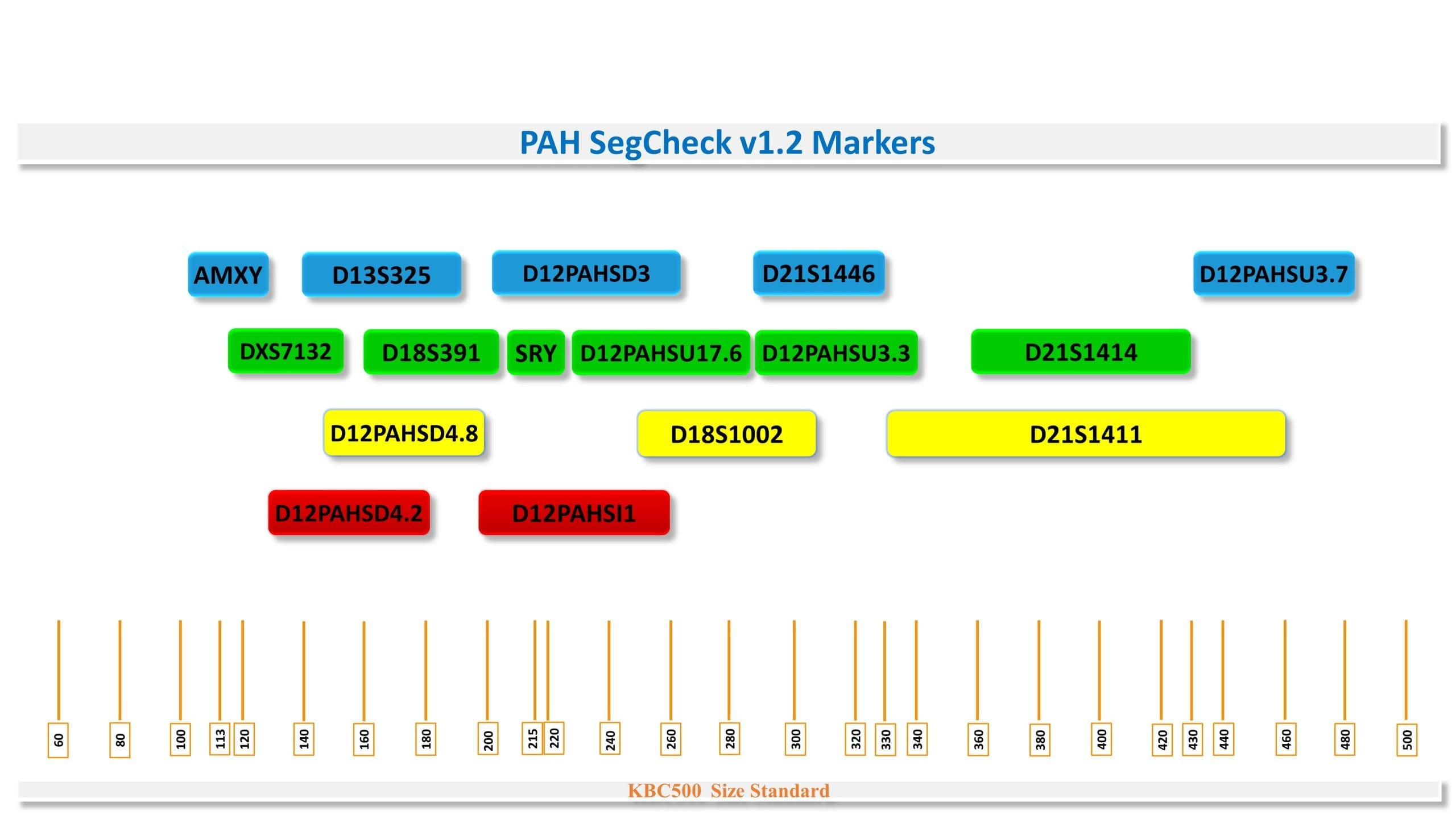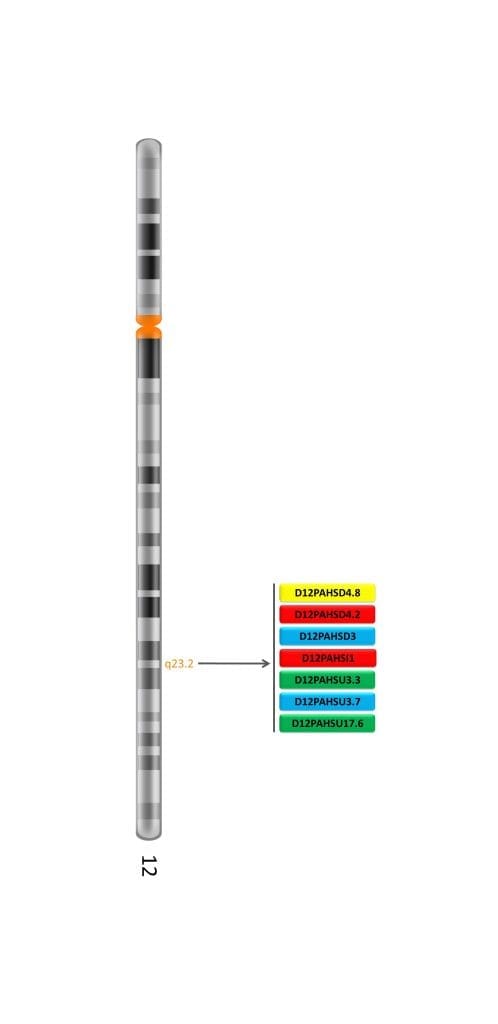PAH SegCheck Kit v1.2
Cat. No: KBC-110202Phenylketonuria diagnostic aid kit along with initial screening for common numerical chromosomal abnormalities
Prenatal diagnosis is prone to misdiagnosis for various reasons. Each year, numerous legal cases exist in this domain, with medical genetics laboratories expending significant effort and capital to perform all necessary precautionary measures to avoid erroneous diagnoses. Most of these misdiagnoses could stem from maternal sample contamination of the embryo sample, sample misplacement in different diagnostic stages, sample mixing, uniparental disomy or UPD, allelic dropout or ADO, crossover, new mutations, and paternity denial.
Kowsar Biotechnology Company has devised a creative method to overcome most causes of misdiagnosis through the use of a multiplex QF-PCR. Each of the kits containing SegCheck™ STR markers is linked to a specific gene. Additionally, they contain STR markers for QF-PCR used for diagnosing common chromosomal aneuploidies in chromosomes 13, 18, 21, X, and Y. The SegCheck™ kits are designed and developed for diagnosing different genetic diseases. Therefore, multiple markers for the target gene increase the accuracy of correct diagnoses and minimize the chance of misdiagnosis, preventing erroneous detections.
Features and Advantages:
-
- Tracking disease gene in the pedigree
- Clarification of embryo sample mixing with maternal samples
- Clarification of sample contamination with another sample
- Verification of embryo sample authenticity and diagnosis error due to sample misplacement
- Determination of sample sex
- Sample identity determination
- Primary screening of chromosomal aneuploidy
- Diagnosis and discernment of embryo samples in multiples
- Detection of uniparental disomy (either heterodisomy or isodisomy)
- Diagnosing crossing over phenomena in HLA investigation and disease creation
- Diagnosing embryonic mosaicism
- Gonadal mosaicism detection (more in disorders associated with X)
- Confirmation of mutation diagnosis results by direct methods like DNA Sequencing, ARMS, MLPA, Gap PCR, and NGS
Why is using SegCheck™ kits important?
In most countries, prenatal testing for chromosomal aneuploidies is conducted in practice. Most conventional methods (i.e., first and second trimester ultrasound and biochemical screening) have drawbacks since they present false-positive or false-negative results in diagnosing chromosomal aneuploidies. QF-PCR has long been a selected method for rapid diagnosis of common chromosomal aneuploidies. However, techniques like QF-PCR and karyotyping should be requested by specialists to be conducted on selected embryo samples. Aware of these shortcomings, Kowsar Biotechnology has produced the SegCheck™ kits designed for over 60 diseases, allowing laboratories to diagnose any disease along with primary screening of aneuploidies via the QF-PCR method without the need for sampling and added costs. Even NIPT tests only analyze aneuploidy in the tested embryo sample. In contrast, the SegCheck™ kit can assess both disease genes and aneuploidies for any embryo sample undergoing prenatal testing. Essentially, each SegCheck™ kit harbors specific STR markers for chromosomes 13, 18, 21, and sex chromosomes along with specific disease STR markers.
STR markers are selected from sequences of 4 nucleotides for less analysis and easier interpretation. Alleles from these STR markers can assist in sample identity validation, maternal cell contamination rejection, and many other benefits in a test. Thus, these chromosomal markers can also be used for aneuploidy checking for the tested chromosomes. If aneuploidy is suspected, the sample can be further analyzed with more markers using the QF-PCR method, like with AneuQuick™ Kit v3.2 or AneuQuick™ Extra Plus Kit v1.2.
Every medical genetics laboratory conducting prenatal diagnosis encounters issues such as sample mixing and maternal cell contamination. These errors can lead to incorrect diagnosis and false-negative screenings.
SegCheck™ can aid any medical genetics laboratory performing prenatal diagnosis. Since these kits have markers that are located within or near a specific disease-related gene and undergo segregation, these markers can be used for segregation tracking and linkage analysis. Haplotype drawing verifies the inheritance of a disease gene mutation in the embryo.
For instance, suppose parents have a similar mutation and due to allelic dropout or ADO during direct mutation diagnosis in the embryo, it appears as a homozygote, but haplotype drawing and analysis in a family show it’s actually a heterozygote due to the non-amplification of the other gene caused by ADO, thereby preventing unnecessary embryo disposal. The reason SegCheck™ kits can detect ADO is that each SegCheck™ kit contains between 4 to 8 STR markers, and a sample cannot have ADO for all these markers.
This method used in these kits will be valuable for most molecular medical genetics laboratories performing prenatal diagnosis. However, it can also be utilized by other researchers for different purposes such as genetic or hereditary segregation or even mosaicism.
Phenylketonuria (PKU) is an inherited metabolic disorder. This disease follows an autosomal recessive pattern. Mutations in the PAH (phenylalanine hydroxylase) gene are responsible for the classic type of this disease. Over 500 mutations have been identified as causing the disease. Screening of carriers, newborns, and also prenatal diagnosis is being conducted in most countries.
PAH SegCheck™ Kit v1.2 is a molecular diagnosis kit that identifies carriers or individuals affected by phenylketonuria shortly. This kit fundamentally operates on STR markers and QF PCR technique to analyze segregation and gene linkage haplotyping, determining the embryo sample’s diseased or carrier status. The use of STR markers, along with direct mutation detection, makes prenatal diagnosis more precise and reliable. Along with diagnosing the gene defect, the PAH SegCheck™ v1.2 kit includes autosomal STR markers for diagnosing aneuploidies of chromosomes 21, 18, 13, X, and Y based on the QF-PCR method.
The diagnostic kit PAH SegCheck™ v1.2 is based on 16 high heterozygosity markers including 7 STR markers downstream and upstream of the PAH gene, 6 for primary screening of common chromosomal disorders (3 markers for chromosome 21, 2 markers for chromosome 18, and 1 marker for chromosome 13) and 3 sex determination markers.
This kit applies to DNA samples purified from blood, amniotic fluid (AF), fetal chorionic villus sampling (CVS), and DBC cards (DNA preservation card produced by Kowsar Biotechnology), BLB blood lysis buffer, AFL amniotic cell lysis buffer, and CVL chorionic villus lysis buffer.
For more information about the product, its use, and analysis of the results, please refer to the user manual.

D12PAHSU3.3, D12PAHSU3.7, D12PAHS17.6, D12PAHI1, D12PAHSD3, D12PAHSD4.2, D12PAHSD4.8, D21S1446, D21S1414, D21S1411, D18S391, D18S1002, D13S325, DXS7132, AMXY و SRY.

User Manual
Quick Protocol
MSDS
Analysis Assistant
Profile





















Reviews
There are no reviews yet.